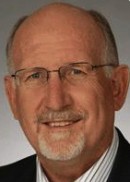Guest Column: Gay wedding cake case, and others, make Christianity look bad
 (Orlando Sentinel, June 13, 2018)
(Orlando Sentinel, June 13, 2018)
by James Coffin
Many in the LGBTQ community breathed a muted sigh of relief when the U.S. Supreme Court, in its decision concerning Masterpiece Cakeshop v. Colorado Civil Rights Commission, stopped short of actually saying that one person’s religious conviction should trump another person’s civil rights. Many conservative Christians had hoped for something more definitive.
But this debate isn’t over. Some other case that will have to be decided more definitively is lurking in the shadows. And Masterpiece Cakeshop gives little indication as to which direction the court may go. But if the case involves a Christian, Christianity, as a religion, will almost certainly lose considerable credibility in the eyes of the public
Allow me to share a story.
Forty-one years ago, when I was a beginning pastor, a young woman who irregularly attended my congregation asked me to dedicate her baby. (My denomination practices “believer’s baptism.” So babies are dedicated and later can choose to be baptized by immersion when old enough to make a personal commitment.)
I declined her request, explaining to her — in tones that I’m now certain came across as the epitome of cold, harsh and uncaring — that because she was not only an unmarried mother but was also cohabiting with the child’s father, it would make a mockery of the whole ritual if those participating were cohabiters. The dedication of a baby is even more so a dedication of the parents, who are publicly committing to raise the child in a godly way. What would the onlooking youth think, granted the church’s adamant stance that marriage is the only venue for legitimate sexual expression?
I look back and shudder — because I’ve come to understand that life is often more complex and nuanced than we might want to admit. And humans have feelings.
Why didn’t I offer to take the couple out to eat so I could get acquainted with the boyfriend? Why didn’t I suggest that as preparation for the ceremony we needed a few sessions about child rearing, and religion, and values? Why was I so concerned about religious rules, so punitive, yet so unconcerned about human feelings? Particularly since I claimed to be a follower of Jesus.
After all, Jesus didn’t mince words concerning the super-religious, who meticulously set aside as tithe every 10th tea leaf and every 10th peppercorn, yet who routinely “neglected the more important matters of the law — justice, mercy and faithfulness.” It was just such people who inspired Jesus’ aphorism, “strain out a gnat but swallow a camel.”
I equally shudder about past relationships — or should I say, lack of meaningful relationships — with those of the LGBTQ label. I deeply regret my judgmentalism. My putting concern for how others might view me ahead of my concern for the feelings and needs of fellow humans who were also on life’s journey, but who were dealing with a different set of challenges and complexities from those I faced.
My standoffishness, my sense of moral superiority was especially noxious granted that Jesus, who I claimed as my exemplar, was more than willing to openly associate with those incorrectly deemed by both religion and society to be unworthy.
I understand the desire of conservative Christians to honor all the Bible’s prescriptions and proscriptions. I also understand how a literal reading of Scripture paints a picture that’s less than charitable toward the whole LGBTQ spectrum.
But those same Scriptures also call for the death penalty for adulterers. So why don’t I hear committed Christian business owners invoking a religious-freedom right not to serve adulterers? Why the double standard? Why such picking and choosing over who’s high enough on the unworthiness scale to deserve being denied services?
Have we forgotten that Jesus declared that God “causes his sun to rise on the evil and the good, and sends rain on the righteous and the unrighteous”?
Are we to assume that a God with such values would expect anything less from us as humans in our dealings with each other?
James Coffin, a member of the Christian clergy, is executive director of the Interfaith Council of Central Florida.
